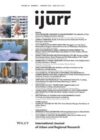Recent scholarship has examined the informal activities of elites. While existing theories suggest that informality is a realm where the state guarantees unhindered access to land and property rights and, subsequently, citizenship entitlements for elites, they have yet to explain how affluent residents of informal colonies obtain citizenship entitlements when the state does not recognize their property claims. Focusing on the case of Sainik Farms, an ‘affluent unauthorized colony’ in Delhi, this article investigates how its residents access citizenship entitlements without legal property rights. It utilizes participant observation, semi-structured interviews and analysis of newspaper archives and government and legal documents, to argue that the residents of Sainik Farms gain access to citizenship entitlements through their institutional, aesthetic, spatial and ideological practices. These practices, which constitute what I refer to as the ‘cultural production of property’, enable them to mimic formal elite settlements that gain citizenship entitlements based on property rights while distancing themselves from people regarded as squatters and the undeserving poor. The article emphasizes that, while the legal aspect of property rights can serve as a powerful tool for accessing citizenship entitlements, the everyday cultural production of property through class mobilization warrants attention in scholarly discourse.
Details
Written by:
Vivek Mishra
Digital Object Identifier (DOI)
https://doi.org/10.1111/1468-2427.70002
About DOI
